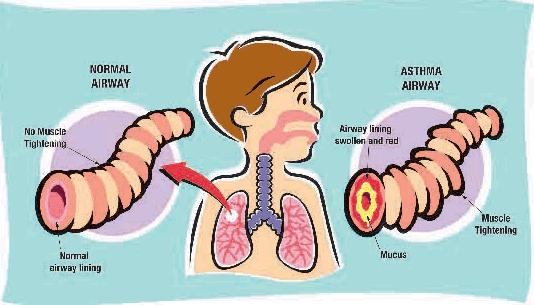What is asthma: Asthma is a chronic disease involving the airways in the lungs. These airways, or bronchial tubes, allow air to come in and out of the lungs. If you have asthma your airways are always inflamed. They become even more swollen and the muscles around the airways can tighten when something triggers your symptoms. This makes it difficult for air to move in and out of the lungs, causing symptoms such as coughing, wheezing, shortness of breath and/or chest tightness.
The signs and symptoms of asthma are – Asthma is characterized by recurrent episodes of wheezing, shortness of breath, chest tightness, and coughing Sputum may be produced from the lung by coughing but is often hard to bring up. During recovery from an attack, it may appear pus-like due to high levels of white blood cells called eosinophils. Symptoms are usually worse at night and in the early morning or in response to exercise or cold air. Some people with asthma rarely experience symptoms, usually in response to triggers, whereas others may have marked and persistent symptoms
With winter on its way, can respiratory ailments be far behind? Learn how to control such conditions. According to modern medicine, asthma is caused by the constriction of the airways as a result of allergic reactions. In defending itself against these reactions, the immune system sometimes goes overboard and triggers inflammation. Ayurveda believes asthma is the result of bad food combinations. These secrete toxins, which collect in the digestive system and are aggravated by wintry conditions, affecting the lungs. To prevent asthma, Ayurveda suggests detoxifying the body before winter with a semi-solid or liquid diet, cleansing therapy, herbs and laxatives. What routine has to be followed –?
Routine:
On taking up, a glass of warm water with half a teaspoon of honey.
A half hour’s walk.
Ayurveda body massage with herbal oils.
A warm water bath followed by a steam inhalation using peppermint essential oil.
Two bowls of warm spinach and corn soup with ginger and black pepper for lunch.
Black pepper and long pepper decoction with a teaspoon of pure honey after lunch.
Light yoga exercises in the evening, followed by a foot massage and a dip of your feet in warm water.
Steam inhalation and a chest massage with sesame oil and a pinch of rock salt.
Two bowls of lentil soup for dinner.
One teaspoon triphala with water a bedtime.
Asthmatics must avoid.
Dairy products, rice, banana and maida, based foods (noodles, pasta, naan, bread, biscuits, rusk). Cold water or drinks. All kinds of melon, especially watermelon. All kinds of fried foods. Heavy dinners, late dinners, all dry fruits, except almonds. All sour foods, including chutneys, achars, ketchup, etc. alcohol.
Avoid these food combinations:
Fruits with curd and dairy products, hot and cold foods together, such as ice-cream with gulab jamun and cold coffee with hot waffles.
Include these herbs in your diet:
Garlic for its anti-allergic properties, liquor ice, which calms the airways, ginkgo biloba, which reduces airway hypersensitivity.
Dust, smoke and cold air are the biggest triggers of asthma, a respiratory condition in which the airways suddenly contract and become inflamed. Given our highly polluted environment, many people, especially children, are prone to asthma. The condition must be carefully managed, especially in winter, when cold air adds to the dust and smoke we breathe already.
General Dos and Don’ts for asthma:
Use a wet duster to clean your home. Dry dusting causes small dust particles to fly and remain suspended in the air for a long time.
Ideally, use a vacuum cleaner for your floors, like the dry duster, the broom lets dust particles fly. If you don’t have a vacuum cleaner, use a wet mop.
Wash your curtains frequently, as they tend to gather dust and pollen. Avoid carpets altogether. They collect dust, pollen and house mites.
Minimize the use of household cleaners. The chemicals in them could trigger coughing, sneezing and asthma attack.
If you’re painting your home or varnishing the furniture, keep asthma-prone family members away.
Avoid using strong chemicals in the rooms of asthma-prone family members. Try natural and herbal alternatives.
Ask your physician for a list of medicines that are unsuitable for asthmatics. Refer to that list whenever you’re buying over the counter medications.
Go to an immunologist for a food allergy test and patch test to identify the allergens than trigger your asthma.
Sometimes, strong emotions like fear and rage can trigger an asthma attack too.
Inhalers and critical medications should be always be close at hand. Family members and your child’s school teachers must be taught what to do in case of asthma attack.
Asthma-prone children must avoid soft toys and all dust-collecting toys.
Do not keep pets at home.
Do not let the asthma-prone be suddenly exposed to hot or cold air.
Get checked by a doctor if you have a cough that leaves you breathless.
Have regular oil massages with a non-fragrant oil.
Do home-based exercises like yoga and Pilates.
Avoid junk food, cold drinks, pickles, fried food, and curd at night.
Stay away from smokers and polluted areas.
List foods that trigger allergies and avoid them.
– All this simple precautions will help you manage this respiratory condition.
TAKE CARE 🙂
SANGITA MAITY.





36 Comments